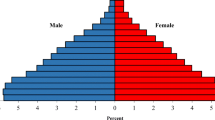Abstract
Sweden has a well-developed welfare system following the Nordic model and it maintains —even though there have been some reductions in the last decade — good economic security and comprehensive services for the elderly. The national policy for the elderly aims at enabling older persons to live independently with a high quality of life. A great majority of the elderly in Sweden live in ordinary homes — very few live with their grownup children. The municipalities are responsible for providing long-term social services and care for the frail elderly in the form of home help services for those that live in ordinary housing, and special housing accommodation for those with extensive needs. The county councils are responsible for health care and provide home nursing care and rehabilitation. Sweden used to have the oldest population in the world. The proportion of 80+ years old in the population increased from 3% to over 5% between 1980 and 2000. Due to financial restrictions as a result of the economic recession in the last decade, the health and social services for the elderly have not been able to keep up with the population development. The previous generous allocation of care has been replaced by a more restrictive approach. This has mainly affected persons with lesser needs for help, younger elderly, and married persons. The number of elderly persons is expected to increase rapidly in the coming decades. However, due to improved health among the elderly, this will lead to a relatively limited increase of needs. Depending on assumptions concerning the health development, the required increase in volume of health and social services is expected to fall somewhere between 10–30% during the coming 30- year period.
Similar content being viewed by others
References
Lagergren M, Batljan I. Will there be a helping hand. Annex 8 to The Long-Term Survey 1999/2000. Stockholm: Fritzes, 2000.
Svanborg A, Berg S, Nilsson L, Persson G. A cohort comparison of functional ability and mental disorders in two representative sample of 70-year-olds. In: Senile Dementia: Outlook for the future. New York: Alan R. Liss, 1984.
Manton KGM, XiLiang G. Changes in the prevalence of chronic disability in the United States black and nonblack population above age 65 from 1982 to 1999. Proc Natl Acad Sci 2001; 11:6354–9.
OECD. The health of older persons in OECD countries. Is it improving fast enough to compensate for population ageing? DEELSA/ELSA/WP1(98)11. Paris: OECD, 1998.
Freedman VA, Martin LG. Understanding trends in functional limitations among older Americans. Am J Public Health 1998; 88: 1457–62.
Swedish National Board of Health and Welfare. Bo hemma på äldre dar (Living at home in your old days). Stockholm: National Board of Health and Welfare, 2001 (in Swedish).
Lagergren M. Disability transitions in an area-based system of long-term care for the elderly and disabled. Health Policy 1994; 28: 153–74.
Lagergren M. SNAC — The Swedish National Study on Ageing and Care (Work in progress, available at: www.aldrecen-trum.se).
Author information
Authors and Affiliations
Corresponding author
Rights and permissions
About this article
Cite this article
Lagergren, M. The systems of care for frail elderly persons: The case of Sweden. Aging Clin Exp Res 14, 252–257 (2002). https://doi.org/10.1007/BF03324447
Received:
Accepted:
Published:
Issue Date:
DOI: https://doi.org/10.1007/BF03324447



